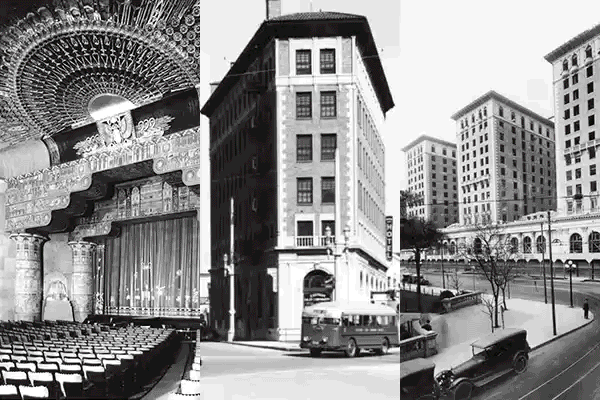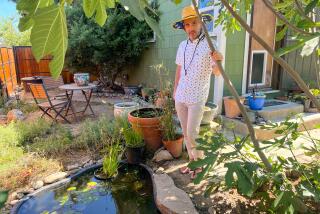Fountain Is Liquid Peace in Busy Downtown
- Share via
No dry run was necessary when the Los Angeles Baroque Orchestra performed last summer on the city’s most unusual stage.
The orchestra chose Handel’s “Water Music,” an appropriate score for an outdoor theater built against a backdrop of 146 dancing fountains.
For the record:
12:00 a.m. March 1, 2002 FOR THE RECORD
Los Angeles Times Friday March 1, 2002 Home Edition Main News Part A Page 2 A2 Desk 2 inches; 36 words Type of Material: Correction
Fountain design--A story in the California section on Thursday incorrectly stated that the company that designed the fountain at California Plaza in downtown Los Angeles is no longer in business. The Universal City firm, Wet Design, continues to operate.
It was a typical mix of civility and excitement at the Watercourt--a place that for a decade has used flowing water to produce a continuous blend of solitude and stimulation.
The amphitheater at California Plaza in downtown Los Angeles doesn’t need musicians on its granite performance stage to stir the soul, however.
Computerized fountain jets dominate a 1 1/2-acre garden courtyard framed by high-rise buildings between Grand Avenue and Olive Street. Geysers that spurt 40 feet high are punctuated by surging waves that cascade into a pond that wraps around flower-filled islands and an open dining area.
Hundreds of Bunker Hill-area office workers spend their weekday lunch hours at the courtyard. Thousands turn out for weekly summertime concerts.
“It’s so relaxing to watch the water. It changes constantly, with it shooting into the air and then cascading down in a waterfall. And the summer shows bring a lot of people downtown who wouldn’t normally be here,” said Michael Kruse, a steel company executive whose office is on the 52nd floor of a nearby tower.
Kruse, of Long Beach, visits the Watercourt as often as three times a week. His favorite spot is above the fountains, where a sunny walkway overlooks the geysers and downtown streets below Angel’s Flight. The whoosh of powerful water jets and the soft gurgle of smaller nozzles combine to drown out the noise of city traffic.
The multilevel Watercourt is an engineering marvel.
The fountain and pond are cantilevered over Olive Street. So, any leaks will empty onto the roadway instead of into California Plaza’s deep underground parking garage.
But for 10 years the fountain system has remained watertight, say engineers who oversee the $17-million installation.
The fountain uses 90,000 gallons of water. Compressed air blasted through 76 “micro-shooter” nozzles hidden in the top stage level sends geysers of varying heights into the air. Behind them are 40 “volume jets” that create what Patrick Saito calls a “curtain wall”--a continuously flowing backdrop to the spurts of water.
Every 14 minutes, other nozzles release 30,000 gallons from the back of the geyser fountain platform. That creates a wave that gushes across the lower-level concert stage before cascading into the pond, said Saito, an assistant chief engineer at California Plaza.
The irregularly shaped pond is only ankle-deep. But its black bottom makes it look deeper to those dining in adjoining patio areas or relaxing on amphitheater seats made of granite cut in Great Britain and Canada and polished in Italy.
Saito said two 50-horsepower pumps move water from a reservoir tucked beneath the dining patio to the top of the fountain. There, a 15-horsepower air compressor runs the geysers and water curtain nozzles.
“The micro-shooters are like little bazookas. Chambers of water are pressurized, and a computer controls the height that the water is released,” he said.
The company that designed the Watercourt system later created the water displays at the Bellagio Hotel in Las Vegas. That firm is now out of business, although minor valve repairs are easy to make. Major maintenance on piping and pumps is performed by a San Fernando Valley company, Saito said.
Fountain maintenance--along with the cost of replenishing the 800 gallons lost to evaporation on a typical hot summer day--costs about $100,000 a year. A nonprofit organization called Grand Performances pays for the upkeep with money contributed by the three major California Plaza property owners: Equity Office Properties, Metropolitan Life Insurance Co. and Omni Los Angeles Hotel.
Grand Performances also stages the summer concert series that offers an eclectic mix of local and internationally known artists. An evening rumba and mambo performance by the 12-member rhythmic ensemble Cubanismo! a few years ago drew a Watercourt crowd of more than 8,000.
“We like to give people something to chew on--to have a taste of a performing arts form they might normally not buy a ticket for,” said Leigh Ann Hahn, director of programming for Grand Performances.
Tentative plans call for this year’s shows to begin in June with a performance by salsa star Johnny Polanco y Su Conjunto Amistad, she said. Lunchtime shows begin at noon Fridays; evening performances are at 8 p.m. Fridays and Saturdays. They are free.
Contributions cover about half of the annual $1.3-million cost of the shows, said Michael Alexander, executive director of Grand Performances. Sponsorships, along with red buckets that are passed through concert crowds for donations, pay for the rest.
Concert planners say they have learned much about the coordination of fountains and concerts since the first Watercourt show was held in October 1992. During the premiere, musicians with the Poncho Sanchez band were nervous about electrocution. They unplugged their microphones and amplifiers and hurried off the stage before the fountains were turned on.
Now dancers sometimes cavort in the middle of the spurting geysers and splash in the pond.
The fountains remain a draw, even without music, said Deborah Matlock, a petroleum company administrative assistant who walks two blocks to visit Watercourt several times a week.
“The water is always so calming and serene,” said the Culver City resident. “You’re in the middle of downtown. But for a few minutes you can forget where you are.”
More to Read
The biggest entertainment stories
Get our big stories about Hollywood, film, television, music, arts, culture and more right in your inbox as soon as they publish.
You may occasionally receive promotional content from the Los Angeles Times.











